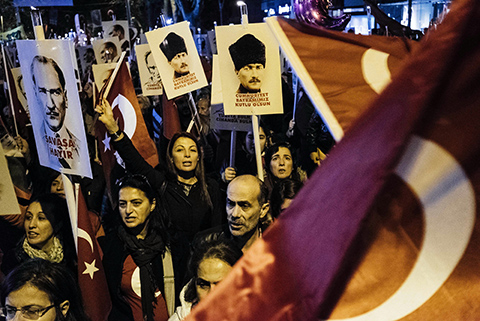ISTANBUL: Turkey goes to the polls tomorrow after five turbulent months without a government, bracing for further instability after devastating jihadist bomb attacks, renewed Kurdish violence and an alarming new crackdown on the media. The country's most important vote in years will also determine the political future of "the big master" President Recep Tayyip Erdogan - even though his name is not even on the ballot paper.
Opinion polls predict Erdogan's Justice and Development Party (AKP) will again win the most votes but is unlikely to claw back the parliamentary majority it lost in a shock setback in June, paving the way for a shaky coalition - or even another election. Erdogan, who critics say is becoming more autocratic as he pushes for greater presidential powers, said Thursday that only a single-party government could ensure stability in the strategic nation of 75 million.
"If our nation makes its choice for a single-party government, then I believe it would lay the ground for the resumption of an environment of stability that we experienced for 12 to 13 years," said Erdogan, the dominant force for 13 years as prime minister and AKP leader and now president.
Security the Major Concern
Another inconclusive result could trigger further turmoil in the Muslim majority country, already more polarised on ethnic and sectarian lines than at any time in its modern history. Security is of paramount concern, after the deadly flare-up of violence in July between Turkish security forces and rebels from the Kurdistan Workers' Party (PKK) shattered a delicate 2013 truce and revived a three-decade-old conflict. The country is also struggling to come to terms with the twin suicide bombings on a peace rally in Ankara this month that killed 102 people in the worst attack in its history.
The atrocity, blamed on the Islamic State group, followed another bomb attack in a town on the Syrian border in July that thrust the NATO ally into a "war on terrorism" against both IS extremists and Kurdish rebels. Ankara has found itself drawn into the conflict across the border as it struggles to cope with more than two million Syrian refugees, while its policy of helping rebels opposed to the Damascus regime backfired disastrously.
Silencing the Opposition
There are also escalating fears about the threat to democracy in the EU hopeful after the authorities launched a violent crackdown on an opposition media group this week. Riot police stormed the offices of two television stations linked to a US-based cleric who Erdogan has accused of trying to topple him by orchestrating a corruption probe against him. "We share widespread concerns that recent events are part of a concerted campaign to silence any opposition or criticism of the government in the run-up to the election," said a letter from editors at around 50 major international media groups including AFP.
Concerns about Turkey's domestic and foreign policies have seen it more isolated on the international stage, as relations with the EU and US cool and it loses friends in the Middle East. Turkey's faltering economy is also at risk, with growth slowing sharply from the dizzy heights of five years ago and the Turkish lira plunging more than 20 percent so far in 2015.
Opinion polls estimate that the AKP, which has won every election since 2002, will score between 40 and 43 percent on Sunday, little changed from the outcome in June. All eyes will again be on the Peoples' Democratic Party (HDP), which made history in June when it became the first pro-Kurdish movement in parliament with enough seats to strip the AKP of its majority. Its success blocked - at least temporarily - Erdogan's hopes of expanding his role into a powerful US-style executive presidency that opponents fear would mean fewer checks and balances.
Analysts expect the AKP to try to form a coalition with at least one other party in the event of another hung parliament, probably the secular Republican People's Party (CHP). Prime Minister Ahmet Davutoglu, who could be fighting for his political life if the AKP fails again to win at least 276 of the 550 seats in parliament, insisted another election was not on the cards for fatigued voters.
"The best scenario would be a coalition government determined to resume the Kurdish peace process, tackle Turkey's economic vulnerabilities and reverse its democratic backsliding," said Asli Aydintasbas of the European Council on Foreign Relations. "The more unfortunate one would be further deepening of Turkey's internal divisions and the onset of the Kurdish war. "The most likely scenario is more of the same - turbulence." - AFP



